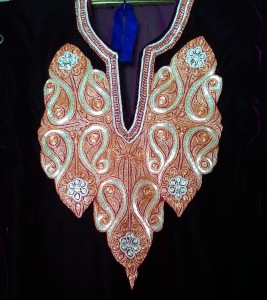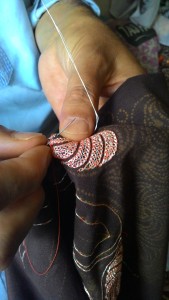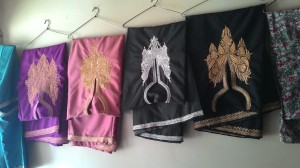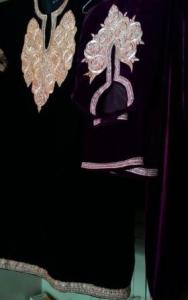Meet Shahnawaz Qureshi, the proud happy owner of his small zari shop at Dalaal Mohalla, Nawab Bazaar. Shahnawaz recalls how he failed in his first matriculation exams and how distraught it rendered him. "I had a backlog in Math, only failing in one book; I had to take another year for all the subjects next year. That was the norm those days. The thought of studying all those books once again cast away any motivation that I had back then to go again for the exams. I decided not to study further and pursue some skill based job. My father is into wood carving. We had a decent workshop back then where all types of wood carving were done, especially walnut wood. However, wood never interested me. I sought out to learn something new and one of my friends introduced me to the art of Zari Kari. That was in the year 1980. After that, it was my life, my ways. I started as a happy young lad into the beautiful world of hand embroideries.”
Shahnawaz found his interest in the hand zari kari, the traditional tilla embroidery of Kashmir, weaving golden and silver threads into classic motifs and patterns on varied textures of Phirans and Shawls. His interest in this specialized hand art only deepened in time. “I trained under master artisan Muhammad Shafi for 6 months. He was kind enough to teach me this skill for free. People were generous and kind in those times. I, being so keen in this work, learned from him much quickly both to his as well as to my own surprise. After my training period, he let me only work on the hemline of phirans, fixing a monthly rate of 100 rupees per month. I did 10 phirans in one month and on an average it took me 5-10 days to work on one phiran and that too, the hemline only. Whatever money I got in those initial days of my work, I used to hand it over to my dear mother. I worked for three years under Shafi Sahab till he left the work, closed his shop due to personal reasons.”
“Luckily, I found myself another master artisan, who coincidently of the same name, Muhammad Shafi took me in, after seeing my skill level. He worked in Khankaah and to this date is very famous for his craftsmanship. I worked with for a very long time. Initially, he gave me 300 rupees per month for working on hemline as well as neck. After I gained some expertise in the craft, he decided to pay me as per the tolla (measurement of zari threadwork) I would work for. At a fixed rate of 300 rupees per tolla, I started earning good money. It depended on the number of phirans I would do each month; my average was 12-15 tollas those days, which gradually increased with time.”
“Patte aaye tehreek, (then came the insurgence), the days of 90’s were horrible for everyone. We were all restricted to the confines of our houses. Business got hit; we were let off due to low work demand. It was in those turbulent times, I decided to move on as an independent craftsman. With whatever savings I had, I bought a small shop, this very shop that you are sitting in, for Rs 10,000. It is not big, but it is enough for me. Life was going smooth, while there were fluctuations, the normal ups and downs as in all business ventures, mine was no exception and I saw the good times and I saw the bad times.”
So you had a peaceful life?
Smiling in ease, Shahnawaz said to me, “Just when you think all is going good, things happen, to turn your life upside down. That is life, it cannot be smooth, there is always some sort of friction, big or small, sooner or later, but it is always there!” After a moment of silence, he continued, “Almost a decade ago, more than that actually, though I don’t remember the exact year, it must have been 2000 or 2002, something like that, there was a robbery in my shop. Someone night robbed my shop and took with them, everything they could lay their hands on. There was nothing left, nothing! The customer orders that lay with me, their phirans, their shawls, my threads, and my needles everything was gone, everything had been looted. I lost my mind for some days. The police could never trace the people behind. I had to repay my customers; I owed them their valuable phirans and precious shawls that I was working on.”
“People, he sighed, “there are all kinds of people. Some were kind enough; empathetic enough to let it go reasoning it with no fault of my own; they let their dues off me. Others I had to pay in full for every penny. It cost me a lot to do so. For next couple of years, I worked endlessly, tirelessly to pay them off. Thanks to the Almighty, I was able to do so quickly. I did not lose hope, it was the test of time, I had seen good times, this was just a bad phase, which I knew in my heart would also pass. Gradually, I gained a strong foothold in our craft which consequently got me more and regular customers. From then to now, it has been an uphill journey, but I am thankful for this gift of art, that I have been bestowed with and wish to continue on it as long as I can.”
Would you like your children to take after this craft? Have you taught them this skill?
“ Aah yemme azyek shurriye cha manaan ” (Ah, these children of today, they don’t go by your rules). I have three young children, two daughters who are in their graduation school, and my son who is in high school. They have no interest in my kasab (skill). They have their own dreams, of being an engineer, doctor and my son, his dreams change every day. They respect me, my work and my craft but want to have nothing to do with it. Sometimes, it make me sad, to think it shall die with me with no one to carry it forward. But what can you do, you cannot force your children into something they are not interested in. I did not do it in my youth, how I can force it upon my children!”
“What is more saddening is the fact, that this art shall have no makers left in future. “Ye chu Kasab (this is a skill), the new generation is abandoning it, the oldies like me that are left now will not live forever. As each artisan in our community dies, it makes me sad to see a little part of this skilled art dying with them as well. And it is not just my skill, it is all others too, the wood carving, the paper mache, and the chain stitch everything is fading away from this modish life which has little space for traditional handmade masterpieces.”
It is all time, everything comes to a full circle.






